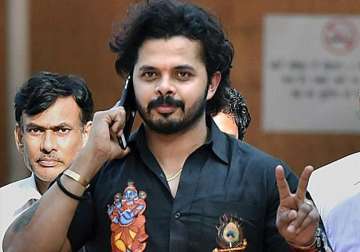New Delhi: The Delhi High Court today agreed to hear the appeal challenging the clean chit given to all the accused, including India's test discard S Sreesanth and two other cricketers Ajit Chandila and Ankeet Chavan, in the sensational 2013 IPL-6 spot-fixing case.
The court, however, adjourned the matter for November 18, after the counsel for the Delhi police requested for it on personal grounds.
“On the request of the Additional Solicitor General, matter is adjourned for November 18,” Justice Siddharth Mridul said.
The Delhi police had moved the High Court on September 2, challenging the trial court's July 25 order giving clean chit to all the accused in IPL-6 spot-fixing case. The trial court's verdict said investigators had failed to gather “all necessary ingredients to establish a prima facie case” under the stringent Maharashtra Control of Organised Crime Act (MCOCA).
The trial court had dropped all charges against 36 accused, holding that the Special Cell of Delhi Police had been unable to establish any “nexus” or link between the accused and crime syndicate allegedly run by fugutive underworld don Dawood Ibrahim and his close aide Chhota Shakeel, who were declared proclaimed offenders in the case along with one Sandeep.
Three other accused—Javed Chutani, Salman and Ehtesham -- were Pakistani nationals and police could not lay their hands on them.
Assailing the verdict, the appeal contended that the trial court had erroneously interpreted MCOCA and its order was unsustainable.
The Delhi Police has argued that the logic and conclusions put forth for discharging the accused was not correct.
Further, it said the trial court had erred completely in interpreting the provisions of MCOCA dealing with crime syndicates and the manner in which the issue of framing of charges had been discussed needed to be looked at again.
Besides the three cricketers, who were the part of IPL team Rajasthan Royals and banned for life for their alleged involvement in crime, several bookies were among 36 named in the 6000-page charge sheet.
The Delhi police had claimed in the charge sheet to have unearthed sufficient evidence to prosecute them for the offence punishable under section 120B (conspiracy) read with 419 (cheating by personation), 420 (cheating) of IPC, besides those relating to MCOCA.
The trial court had disagreed with the Delhi Police for invoking MCOCA against the accused and said, “The best case could have been under Public Gambling Act, but that also is not prima facie established from the evidence placed on record by the prosecution.”
“The offence of cheating is also not made out prima facie, even if the entire evidence of prosecution is admitted without formal proof,” the trial court had added.
